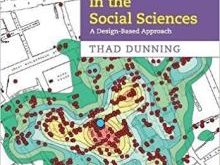Keynes on the methodology of econometrics There is first of all the central question of methodology — the logic of applying the method of multiple correlation to unanalysed economic material, which we know to be non-homogeneous through time. If we are dealing with the action of numerically measurable, independent forces, adequately analysed so that we were dealing with independent atomic factors and between them completely comprehensive, acting with...
Read More »On the difference between econometrics and data science
On the difference between econometrics and data science .[embedded content] Causality in social sciences can never solely be a question of statistical inference. Causality entails more than predictability, and to really in depth explain social phenomena require theory. The analysis of variation can never in itself reveal how these variations are brought about. First when we are able to tie actions, processes or structures to the statistical relations...
Read More »Fooled by randomness
A non-trivial part of teaching statistics to social science students is made up of teaching them to perform significance testing. A problem yours truly has noticed repeatedly over the years, however, is that no matter how careful you try to be in explicating what the probabilities generated by these statistical tests — p-values — really are, still most students misinterpret them. A couple of years ago I gave a statistics course for the Swedish National Research School in...
Read More »Big data truthiness
All of these examples exhibit the confusion that often accompanies the drawing of causal conclusions from observational data. The likelihood of such confusion is not diminished by increasing the amount of data, although the publicity given to ‘big data’ would have us believe so. Obviously the flawed causal connection between drowning and eating ice cream does not diminish if we increase the number of cases from a few dozen to a few million. The amateur carpenter’s complaint...
Read More »Econometrics and the challenge of regression specification
Econometrics and the challenge of regression specification Most work in econometrics and regression analysis is — still — made on the assumption that the researcher has a theoretical model that is ‘true.’ Based on this belief of having a correct specification for an econometric model or running a regression, one proceeds as if the only problem remaining to solve have to do with measurement and observation. When things sound too good to be true, they usually...
Read More »How scientists manipulate research
How scientists manipulate research [embedded content]All science entails human judgment, and using statistical models doesn’t relieve us of that necessity. Working with misspecified models, the scientific value of significance testing is actually zero — even though you’re making valid statistical inferences! Statistical models and concomitant significance tests are no substitutes for doing real science. In its standard form, a significance test is not the...
Read More »Econometrics — the art of pulling a rabbit out of a hat
Econometrics — the art of pulling a rabbit out of a hat In econometrics one often gets the feeling that many of its practitioners think of it as a kind of automatic inferential machine: input data and out comes causal knowledge. This is — as Joan Robinson once had it — like pulling a rabbit from a hat. Great — but first you have to put the rabbit in the hat. And this is where assumptions come in to the picture. The assumption of imaginary ‘superpopulations’...
Read More »Fuzzy RDD & IV (student stuff)
Fuzzy RDD & IV (student stuff) .[embedded content]
Read More »COVID19 and causal inference (wonkish)
COVID19 and causal inference (wonkish) .[embedded content]
Read More »Natural experiments in the social sciences
Natural experiments in the social sciences How, then, can social scientists best make inferences about causal effects? One option is true experimentation … Random assignment ensures that any differences in outcomes between the groups are due either to chance error or to the causal effect … If the experiment were to be repeated over and over, the groups would not differ, on average, in the values of potential confounders. Thus, the average of the average...
Read More » Heterodox
Heterodox





